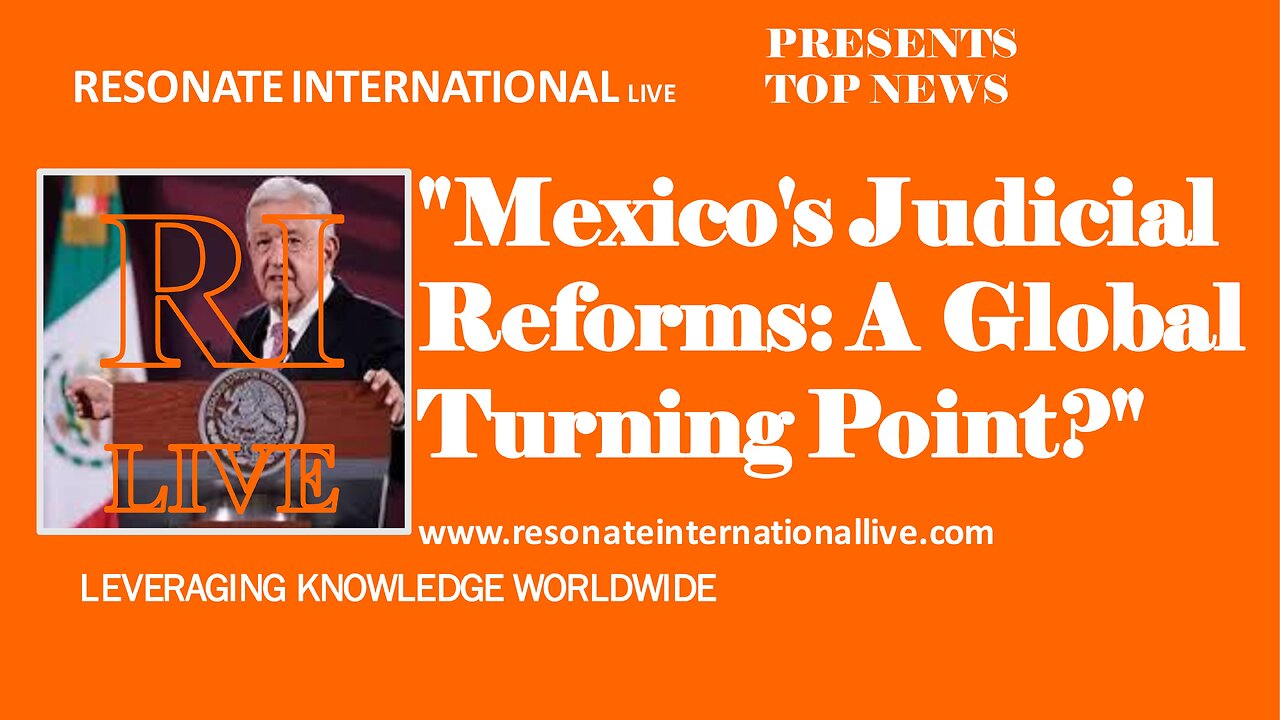Premium Only Content

"Mexico's Judicial Reforms: A Global Turning Point?"
Mexico’s recent judicial reforms are making headlines, not only for their bold vision but also for the controversy surrounding them. Spearheaded by President Andrés Manuel Lopez Obrador, these reforms have sparked significant debate both domestically and internationally. These judicial reforms, which include electing judges through popular vote, aim to combat corruption, increase accountability and improve efficiency. The reforms have not been without controversy. Protests had erupted across Mexico, with critics arguing that the changes could politicize the judiciary and compromise its impartiality. The United States and Canada, key trade partners of Mexico, have expressed apprehensions about the reforms’ impact on investor confidence and the rule of law. As Mexico advances its reform agenda, the experiences of other nations can provide it with invaluable lessons in its judicial restructuring. While the Global attention for sure shall remain on this bold decision taken by Mexico by setting a unique precedent on the world stage, let’s examine the above with respect to its background and the Controversy through following Data-Driven Insights.
In Mexico, the judiciary has been historically plagued by corruption, with Transparency International ranking it 124th out of 180 countries in 2023. The new reforms aim to address this by making judges accountable to the electorate.
According to a 2022 survey by the National Institute of Statistics and Geography (INEGI), 70% of Mexicans believed that the judiciary was corrupt. The reforms aim to restore public trust by involving citizens directly in the selection process.
A study by the World Justice Project in 2023 ranked Mexico 99th out of 139 countries in terms of judicial independence.
No other country has implemented a system where all judges are elected by popular vote. This makes Mexico’s approach a unique experiment in judicial reform.
-
 DVR
DVR
The Dan Bongino Show
2 hours agoThe Momentum Keeps Shifting (Ep. 2435) - 03/04/2025
211K297 -
 LIVE
LIVE
Benny Johnson
1 hour ago🚨Trump Attorney General Drops a New ‘TRUCKLOAD’ of Epstein Evidence | Kash FIRES FBI Head, Cover-Up
9,322 watching -
 LIVE
LIVE
The Rubin Report
1 hour agoMarco Rubio Destroys CNN Host’s Narrative with Facts in Only 1 Minute
3,550 watching -
 LIVE
LIVE
Steven Crowder
2 hours ago🔴 What Are Pam Bondi's Real Motivations? What It Means For The Epstein Files
45,499 watching -
 LIVE
LIVE
LFA TV
15 hours agoTARIFFS HAVE BEGUN! | LIVE FROM AMERICA 3.4.25 11AM
4,463 watching -
 1:04:22
1:04:22
Timcast
2 hours agoTrump DEMANDS Apology From Zelenskyy, FREEZES ALL AID, Ukraine Warfront Faces COLLPASE | Timcast
46.6K41 -
 27:10
27:10
Rethinking the Dollar
31 minutes agoPeter Schiff Calls For Trump Crypto Rug Pull Investigation | Morning Check-In
1 -
 LIVE
LIVE
Bannons War Room
14 days agoWarRoom Live
20,692 watching -
 54:57
54:57
BonginoReport
4 hours agoIntroducing Hayley Caronia (Ep.152) - 03/04/2025
97.7K90 -
 2:35:27
2:35:27
Matt Kohrs
11 hours agoGAME OVER! The Stock Market Crash Will Get Worse || The MK Show
33K3